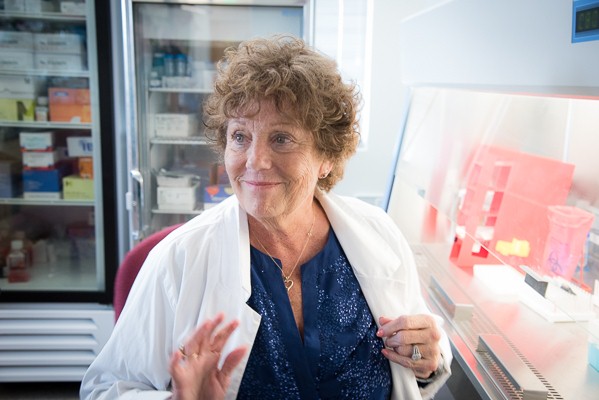Researchers focus on translating science into better health for mothers and babies [Multimedia]
From molecular discoveries to health policy applications, Drs. Maureen Groer and William Sappenfield have built impressive careers working to improve perinatal care.
Many parents may never understand how the health of their children begins long before birth, but USF Health’s Maureen Groer, PhD, and William Sappenfield, MD, MPH, are both passionate about translating research into better health care and outcomes for mothers and babies.
Dr. Groer, who holds a PhD in physiology, is a pediatric nurse, family nurse practitioner and the Gordon Keller Professor at the USF College of Nursing. She works primarily at the micro level – examining the molecular mechanisms underlying immunology, biology and behavior and how the “crosstalk” among these systems may affect the health of infants and their mothers.

USF College of Nursing’s Maureen Groer, RN, PhD, FAAN, a nurse physiologist with more than 35 years experience, studies underlying biobehavioral mechanisms affecting the health of infants and their mothers.
Dr. Sappenfield, a pediatrician and epidemiologist, is professor and chair of Community and Family Health at the USF College of Public Health, director of the Lawton and Rhea Chiles Center for Healthy Mothers and Babies, and co-director of the Florida Perinatal Quality Collaborative. He works at the macro level – joining a variety of stakeholders to distill population data about diseases and their risk factors, treatment patterns and socioeconomic conditions into meaningful policies and practices to improve the health of mothers and babies.

William Sappenfield, MD, MPH is an epidemiologist and professor at the USF College of Public Health.
Using the power of meaningful data to help transform perinatal care quality
Even though he is a board-certified pediatrician, Dr. Sappenfield decided to embark on a career of public health research and practice instead of entering a traditional medical practice following his residency. He earned a master’s of public health degree from Harvard and completed postdoctoral training in preventive medicine and applied epidemiology at the Centers for Disease Control and Prevention (CDC).
“I fell in love with public health, because it was a way I could impact the health of children and families on a population basis, not just one child at a time,” Dr. Sappenfield said. “Knowing I can work with others to make a true measurable difference in lives of mothers, children and families gives me all energy I need to get up every day and go again.”
One of Dr. Sappenfield’s key academic achievements to help transform quality of care for pregnant women and newborns has been co-founding and co-directing the Florida Perinatal Quality Collaborative (FPQC) with John Curran, MD, professor of pediatrics and an associate vice president at USF Health.
The FPQC provides leadership and technical assistance to public and private partners across the state, often joining perinatal quality collaboratives in other states to launch health care quality improvement initiatives. Physicians, nurse midwives, nurses, public health professionals, hospitals, advocates, policy makers and payers voluntarily and collectively work together on select evidence-based initiatives to make measurable improvements in Florida’s maternal and infant health outcomes.
“Most of the initiatives we’re funded to do at $100,000 to $200,000 per year have been saving millions of dollars in costs while also improving health care and the quality of lives of mothers and babies,” Dr. Sappenfield said.
For example, one of FPQC’s first successes was its participation in a March of Dimes-supported, multistate pilot project to reduce escalating rates of early elective deliveries – inductions of labor and C-sections without a medical reason before a baby reaches a full 39 weeks gestational age. Babies delivered before full term are at higher risk for serious complications, including respiratory distress, brain injuries, learning disabilities, and breastfeeding problems.
Excerpts from USF Health News. Read the full story here.
Related story:
How are CHIPRA quality demonstration States improving perinatal care?
